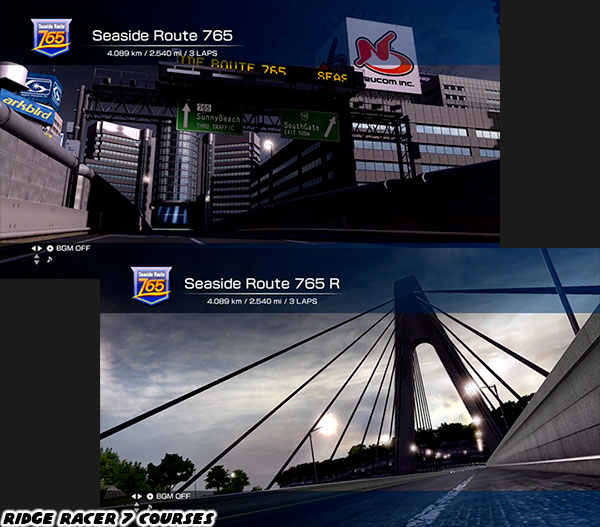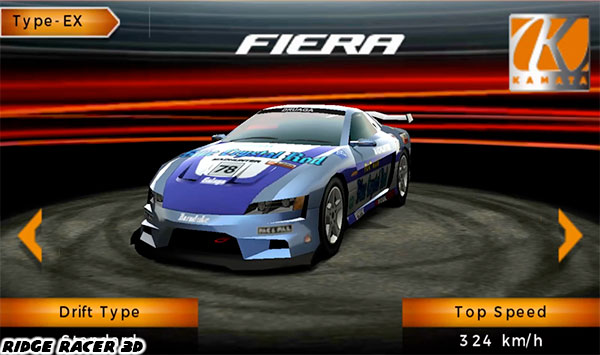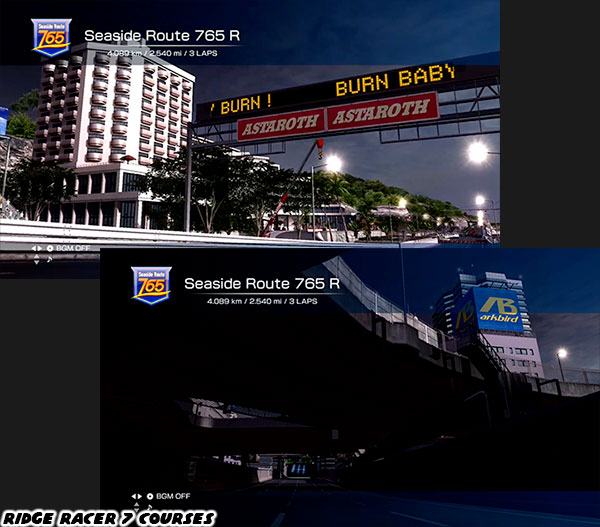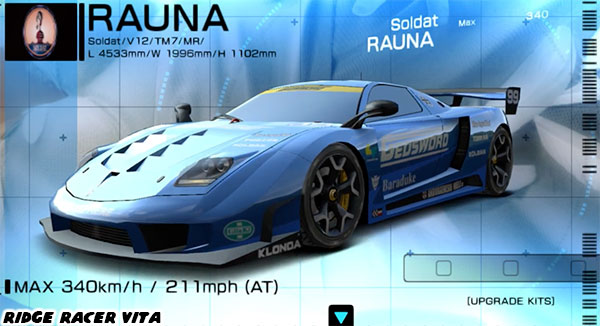The music in the Ridge Racer series had always been well done. I was not a big fan of electronica, techno or house music. With that said I would be lying if some of my favorite tunes were not from those genres thanks to Ridge Racer. The various composers working at Namco had managed to make me a believer in the format. It only took 20 years of steady evolution to reach that point. To be fair however the early songs from the Ridge Racer series could hold up to many of the new songs. The composers had managed to create remixes from songs featured in every generation of the series and kept them fresh when placed next to the newer songs. It stood to reason that the music featured in the franchise would last forever. The Namco Sound Team had composed many classic themes over the past 30 years. What game player does not remember at least a few jingles featured in Pac Man, Galaga or Pole Position?

The Japanese audiences often had the fortune of being able to purchase albums based on their favorite games. Just about every arcade and console game had an album associated with it. The Ridge Racer series had one of the best collections of electronic music ever assembled. The senior in-house composer Shinji Hosoe had worked scoring Ridge Racer but also several other titles including Galaxian
3 Project Dragoon and Attack Of The Zolgear, Starblade, Cyber Sled and Cyber Cycles. I had talked about some of the games he had worked on much earlier in this series. Mr. Hosoe was better known in the gaming community by his nickname MEGATEN, or SamplingMasters MEGA. Some of his standout compositions included Rotterdamn Nation, Over the Highway and Rare Hero. His college Kohta Takahashi
started composing at Namco with Ridge Racer Type 4. He also created the soundtrack for Klonoa, Ridge Racer V and Ace Combat 2.

Mr. Takahashi was joined on R4 by Hiroshi Okubo who also composed the music in Ace Combat 2. Mr. Okubo was known for his catchy songs including Quiet Curves, Chasing All My Dreams and Transparency. He also did an amazing remix of the Pac Man theme called Eat 'em Up in Ridge Racer V. The collection of artists had a few decades of experience between them yet only represented a portion of the Namco Sound Team. I would dare say that the collective work of Shinji Hosoe, Ayako Saso and Nobuyoshi Sano (SANODG) on certain soundtracks was predictive of future trends. The electronic music they created had a certain synthesizer meets dance beat to it that predicted the rise of artists like Daft Punk. The music that they created for the Galaxian
3 titles for example sounded like the framework that Daft Punk used in the Tron Legacy film soundtrack almost 16 years later.

Their music was so influential that the composers were invited again and again to contribute to the live broadcast of the Playsation Vita in Japan.
SANODG went into crazy mode, joking with the audiences and interrupting his mixes during his set. Mr. Okubo on the other hand
had a fantastic set which he didn't interrupt at all. Playing his role like a serious club DJ.

Every game in the Namco universe had a specific sound. Some were pop in nature, some were rock oriented. The Ridge Racer series had always had an electronic tilt to it. Many audiences in Japan and the US were first exposed to the heavy beats thanks to the arcade releases. People in Europe were already familiar to the club sound and were undoubtedly glad that it became globally accepted. By the time Rave Racer was released the company had firmly planted themselves in the genre. Some of the songs featured manic beats and heavy drum and bass lines that would have gone over amazingly well at a rave. Young Japanese composers had grown up on this style of music and began applying to Namco as well. Taku Inoue a composer featured on Ridge Racer 7, Pac Man Championship DX and the Tekken series grew up playing the classics on the Playstation thanks to the Namco Collection. As a teenager he would challenge himself
to emulate the stylings of classic games like Dig Dug, Pole Position and Pac Man on his home computer. His ability to compose and remix was a perfect fit for the company.

Many freelance composers working in the genre had also lent a hand to the songs in Ridge Racer 6, 7 and the PSP and Vita releases. The majority of the songs were so well done that many were featured for the soundtrack of Ridge Racer Unbounded and Ridge Racer Slipstream. Bugbear Entertainment and Invictus could never hope to live up to the legacy of the Namco Sound Team or their network of musicians. The lineup featured in the mobile game Slipstream read like a who's-who of the best composers and their songs. Akitaka Tohyama - Turn Me On and Freak Out, ESTI - Supercruiser and Kalidescope, Samplingmaster Mega - Combustion and Listen up!, Samplingmaster Aya - Nitro Witch and Shut Up Baby, Hiroshi Okubo - Orbital Rock, M.T.T.B. and Transparency, Rio Hamamoto - Beat Assassinator and Skidmarks, Ryuichi Takada - Down To Earth and Saturation, Tetsukazu Nakanishi - Awakening, Sanodg - Hard Drive and Onyx, NBGI - Eat The World, U - Electro Madness. When Slipstream hit the iTunes Store it joined a series of classic Namco arcade titles and remakes for mobile devices. What was most obviously lacking was a collection of soundtracks from the various Ridge Racer games that the Slipstream songs were culled from.

It took almost 20 years for Namco to realize that there was a demand for the Ridge Racer soundtracks in the west. So they made several of those, along with other popular scores from Tekken and Ace Combat, available for download. The album prices were $9.99 like most full releases. They were well worth it, especially for audiences that longed for a rip of the songs from the games. Fans could now support Namco and show them that there was still a strong interest in the classic Ridge Racer experience. For two bucks audiences could also get amazing 40 minute mixes of several recent Ridge Racer soundtracks. I finally found a reason to use all the iTunes gift cards I had been accumulating over the years.

At the dawn of the arcade industry Namco was much more forward thinking. Only in recent years had they decided to follow the trends rather than lead. For a period of time they went toe-to-toe with Sega in the arcade. Both studios pushed their development teams as far as they could. In the process they created entirely new experiences. Their rivalry had forever changed the industry. Sega may have been considered the better of the publishers when it came to arcade racing games but Namco had outlived their rivals on the consoles. Believe it or not there was one genre in the arcade that Namco had surpassed Sega and every other company. The next portion of this series will look at the greatest decades in Namco history.
If you would like to sponsor me
please visit my Patreon page and consider donating each month, even as little as $1 would help make better blogs and even podcasts!





No comments:
Post a Comment